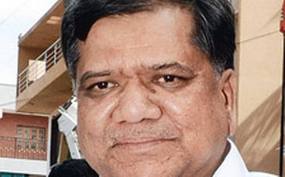Bangalore, Jan 16: Karnataka Government is contemplating amending laws to ensure that rapists do not get bail and police have been directed to book them under Goondas Act and take steps to prevent atrocities, including rape, against women, Chief Minister Jagadish Shettar said today.
Outlining measures being initiated by the government for women's safety against the backdrop of the Delhi gang rape incident, Shettar said police have also been directed to deal sternly with rapists.

He was speaking after inaugurating a meeting of elected women panchayat members of BJP, organised by the party Women's Morcha here.
In another development, Minister for Energy Shobha Karandlaje called on Shettar and urged him to take steps to check atrocities against women.
The lone woman minister in the BJP government discussed the recent incident of a young housewife being lured in Chikkaballapur by some persons, who not only raped her, but also sold her to a brothel in Delhi.
Shobha, who had earlier written a letter to Shettar seeking more steps for women's safety, also requested him to direct police to check trafficking of women and keep a vigil on cases of girls going missing.
Shobha said she discussed various issues concerning women's safety with the chief minister.
Meanwhile, the Karnataka High Court today directed the state government to inform the court within a week about the steps taken by it for rehabilitation of the rape victims and providing funds for compensation to the victim or dependants as contemplated under amended section 357-A of the CrPC.
A Division bench, headed by acting Chief Justice K Sreedhar Rao issued the direction on a PIL filed by advocate M K Vijaya Kumar on the rising incidents of crime against women in the state including rape.
The petitioner had sought an exclusive Rehabilitation Centre for victims of gang rape to be maintained by the state government with at least one psychiatrist and a woman counsellor.
Counsel for the petitioner G R Mohan had submitted if the victim was a woman, it was the responsibility of the state to provide her employment and if it is a minor, the child should be provided with education.
"There must be help from the NGOs in case the rape victims are not willing to stay in the rehabilitation centre so that NGOs can educate the neighbourhood and others as to how to treat such victims. The victims must also be provided free legal aid till the proceedings before the courts are over", the petitioner had submitted.
The state government should also think of amending the Anti-Goonda Act so that those arrested in connection with gang rape, is not granted bail till the completion of trial and the state government should also direct police to provide protection to the victims and also witnesses till the case reaches its logical end, the petitioner submitted.
He also sought, among other things, ramping up the number of woman police officers for investigating rape cases.
Karnataka police asked to book rapists under Goondas ActBangalore, Jan 16, 2013 (PTI):Karnataka Government is contemplating amending laws to ensure that rapists do not get bail and police have been directed to book them under Goondas Act and take steps to prevent atrocities, including rape, against women, Chief Minister Jagadish Shettar said today.
Outlining measures being initiated by the government for women's safety against the backdrop of the Delhi gang rape incident, Shettar said police have also been directed to deal sternly with rapists.
He was speaking after inaugurating a meeting of elected women panchayat members of BJP, organised by the party Women's Morcha here.
In another development, Minister for Energy Shobha Karandlaje called on Shettar and urged him to take steps to check atrocities against women.
The lone woman minister in the BJP government discussed the recent incident of a young housewife being lured in Chikkaballapur by some persons, who not only raped her, but also sold her to a brothel in Delhi.
Shobha, who had earlier written a letter to Shettar seeking more steps for women's safety, also requested him to direct police to check trafficking of women and keep a vigil on cases of girls going missing.
Shobha said she discussed various issues concerning women's safety with the chief minister.
Meanwhile, the Karnataka High Court today directed the state government to inform the court within a week about the steps taken by it for rehabilitation of the rape victims and providing funds for compensation to the victim or dependants as contemplated under amended section 357-A of the CrPC.
A Division bench, headed by acting Chief Justice K Sreedhar Rao issued the direction on a PIL filed by advocate M K Vijaya Kumar on the rising incidents of crime against women in the state including rape.
The petitioner had sought an exclusive Rehabilitation Centre for victims of gang rape to be maintained by the state government with at least one psychiatrist and a woman counsellor.
Counsel for the petitioner G R Mohan had submitted if the victim was a woman, it was the responsibility of the state to provide her employment and if it is a minor, the child should be provided with education.
"There must be help from the NGOs in case the rape victims are not willing to stay in the rehabilitation centre so that NGOs can educate the neighbourhood and others as to how to treat such victims. The victims must also be provided free legal aid till the proceedings before the courts are over", the petitioner had submitted.
The state government should also think of amending the Anti-Goonda Act so that those arrested in connection with gang rape, is not granted bail till the completion of trial and the state government should also direct police to provide protection to the victims and also witnesses till the case reaches its logical end, the petitioner submitted.
He also sought, among other things, ramping up the number of woman police officers for investigating rape cases.



Comments
Add new comment